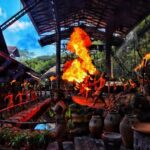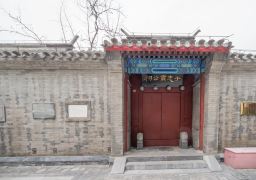The China Silk Museum is located at the foot of Yuhuang Mountain. It is one of the important museums in Hangzhou. Inside, there are a large number of silk fabrics and historical materials on display for you to understand the history of silk weaving. There are also staff members who explain how to distinguish genuine and fake silk. Entering the museum, you first come to ‘The Story of Chinese Silk’, which is divided into two exhibition halls: the cultural relics hall and the costume hall. In the cultural relics hall are silk artifacts from various eras. You can also see enlarged models of various silk varieties and feel the exquisiteness of silk textile and its status in ancient life. The costume hall displays many real silk clothing items. From aoqun (a traditional Chinese women’s two-piece dress), bufu (a mandarin jacket with embroidered insignia), dragon robes popular from the Warring States period to modern times, and even daily household embroidery products are all available. You can understand the origin and development of silk clothing. Crossing the overpass of the main building and continuing to visit ‘The Ingenuity of Silkworms’, here is the display of mulberry silk weaving techniques, which contains several small exhibition halls. Among them, in the dyeing and weaving hall, you can not only understand the dyeing and weaving production process through weaving tool models. The weaving workshop is a fully open exhibition hall where staff members perform loom operations on site. Further inside, on the first floor of the textile cultural relic restoration exhibition hall, the techniques and processes of silk restoration are displayed. On the second floor, restored textile cultural relics are displayed. In the Xinyou Documentation Center inside the museum, you can see some related books and audio-visual materials. In addition, there is also a temporary exhibition hall in the museum where some temporary special exhibitions are held. Near the exit, there is a silk mall that sells various silk clothing and products. The prices are not cheap. However, the silk store in the museum makes people feel reliable. You can buy some as souvenirs. After coming out of the museum, the adjacent Yuhuang Mountain scenic area can be visited together.
The opening hours are from 09:00 to 17:00 all year round from Tuesday to Sunday; closed all day on Monday all year round; open from 09:00 to 17:00 on New Year’s Day, Spring Festival, Tomb-Sweeping Day, Labor Day, Dragon Boat Festival, Mid-Autumn Festival, and National Day. Service facilities: Museum guide: 1. Free guided tours Tour time: 10:00 am; 2:00 pm Tour scope: In the morning, Silk Road Hall; in the afternoon, Fashion Hall Tour duration: 30 minutes per session 2. Paid guided tours (1) Basic exhibition tour Tour duration: 60 minutes Tour scope: Silk Road Hall, Intangible Cultural Heritage Hall, Fashion Hall Charging standard: For Chinese language, 120 yuan for 8-20 people, 180 yuan for 21-40 people. For English language, 140 yuan for 8-20 people, 200 yuan for 21-40 people. (2) Basic exhibition + special exhibition tour 1. Basic exhibition + 1 special exhibition tour Tour duration: 90 minutes Tour scope: Silk Road Hall, Intangible Cultural Heritage Hall, Fashion Hall, and 1 special exhibition Charging standard: For Chinese language, 140 yuan for 8-20 people, 200 yuan for 21-40 people. For English language, 160 yuan for 8-20 people, 220 yuan for 21-40 people. Audio guide rental: Reference price: -; Address: -; Users need to present valid documents such as ID cards and passports and fill in the free use registration form for voice navigators truthfully.A deposit of 200 yuan is required for each audio guide borrowed. The deposit will be returned by the staff upon confirmation that the guide is in good condition upon return. Essential Tips: 1. The museum offers free guided tours, with the reservation phone number being 0571-87035223. 2. Audio guides can be rented for free by presenting valid identification such as an ID card and paying a deposit of 200 yuan. 3. Flash photography is not allowed in the ‘Chinese Silk Story’ cultural relics hall.









